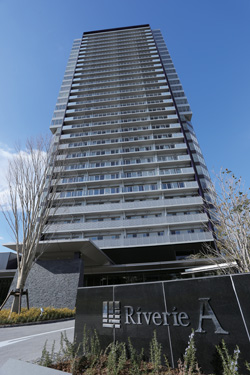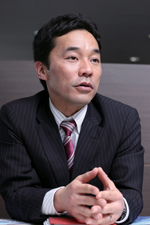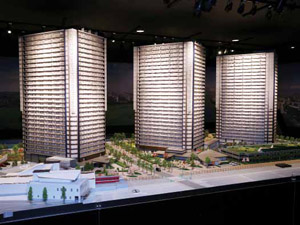
 One of the three residential towers of Riverie. TOYO KEIZAI, INC.
One of the three residential towers of Riverie. TOYO KEIZAI, INC.The high-rise condominium Riverie is situated in front of Minatocho Station on the Keikyu Daishi Line, just one stop from Keikyu Kawasaki Station. It is 12 minutes by train from Shinagawa and 15 minutes from Haneda Airport International Terminal Station.
The name Riverie comes from its location right next to the Tama River. The area along the waterway is rich in greenery.
The condominium also boasts cutting-edge quake-resistance technology, a key issue for Japanese and non-Japanese residents alike, said Atsushi Hagiwara of the residence section of Keikyu Corp, which developed the property.
As buyers' consciousness of disaster prevention has increased, Riverie adopts the dual frame system (DFS) quake-resistance structure developed by OBAYASHI Corp., which built the condo.
DFS, which won a technology award from the Japan Society of Seismic Isolation in 2011, is in the spotlight in the construction industry. There are four buildings using DFS in the Kansai area, but Riverie is the first in the Kanto area.
 Atsushi Hagiwara of the residence section of Keikyu Corp. TOYO KEIZAI, INC.
Atsushi Hagiwara of the residence section of Keikyu Corp. TOYO KEIZAI, INC.A building using DFS has a box-shape structure in the center. The central structure, which in the case of Riverie is used as a multilevel car parking facility, is connected to the residential building via oil dampers, which function as cushions during an earthquake or in strong winds. The oil dampers' efficiency to mitigate shaking is higher in DFS and the level of shaking for buildings with DFS is a third of that for non-DFS buildings. Also, DFS mitigates vibrations faster than other types of quake-mitigating methods.
The use of a central pillar as in DFS can be observed in Horyuji Temple in Nara, known as the world's oldest wooden structure. An age-old Buddhist temple structure such as Horyuji Temple has survived many quakes over 1,300 years, making such architecture among the most quake-resistant.
Riverie also has a store of food in case of disaster. THE FARM CAFE on the second floor of Riverie always has enough rice to provide three meals for every resident. There is a bench that can convert into a kamado (earthen stove) in a garden on the condominium's grounds so that rice and other food can be cooked in the event electricity and gas supplies are cut off.
The Tama River, flowing next to Riverie, has superlevees that eliminate the possibility of flooding.
The views from the balcony are breathtaking, with the Tama River's grand blueness, Tokyo Tower, Tokyo Skytree, skyscrapers in Tokyo, Mount Fuji, and airplanes landing at and taking off from Haneda Airport all within sight.
Keikyu Corp., the operator of the Keikyu lines, will create a new ticket gate specifically for the convenience of Riverie residents. The distance from the gate to the grounds of Riverie is a mere 13 meters.
 Riverie is composed of three buildings — Residence A, Residence B and Residence C — located next to each other. As a whole, Riverie will house 1,408 households. KEIKYU CORP.
Riverie is composed of three buildings — Residence A, Residence B and Residence C — located next to each other. As a whole, Riverie will house 1,408 households. KEIKYU CORP.Riverie also has various services for busy residents. It collaborates with the nearby Ito-Yokado department store to enable the delivery of fresh foods and other products to the homes of residents or to their mailboxes. A kindergarten with state accreditation is located on the premises, the perfect location to make working parents' lives easier.
At the entrance hall, concierges are stationed from 9 a.m. to 8 p.m. to provide various services, such as calling for a cab and keeping clothes until the dry-cleaning company picks them up. Security guards are on the premises 24 hours a day.
Such a luxurious atmosphere and services like a hotel are prerequisites for a 21st-century residence.
For more information, call 0120-3710-45 at Keikyu Corp.'s Riverie Kawasaki Minatocho condominium gallery. Open from 11 a.m. to 6 p.m. weekdays, and from 10 a.m. to 6 p.m. Saturdays, Sundays and national holidays. Closed Tuesdays and Wednesdays. Also, visit www.minatocho.jp





People have different images for "luxurious residences." Some say apartments costing more than ¥50 million are "luxurious," while those priced at ¥1 billion also exist. Regarding rental apartments, those with rent ranging from ¥200,000 to ¥4 million are labeled "luxurious," as if those in the lower end and the higher end are equally luxurious.

Accommodation arrangements are always a source of headaches when Japanese companies invite their foreign group companies' employees to Japan for training or when companies outside Tokyo send their employees to the capital.